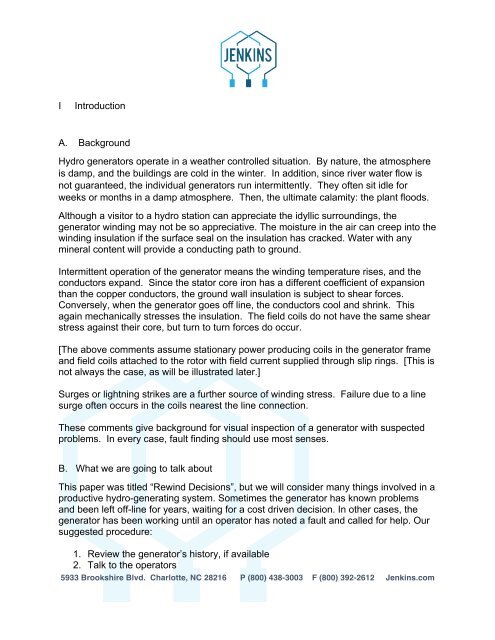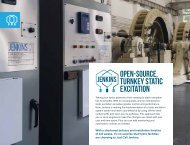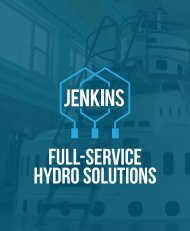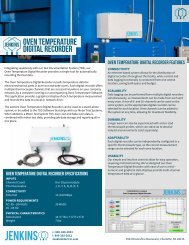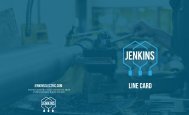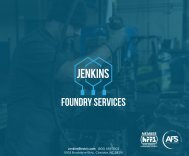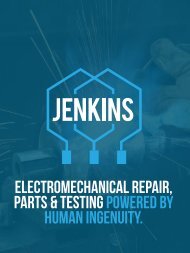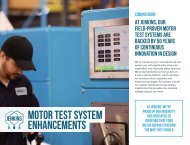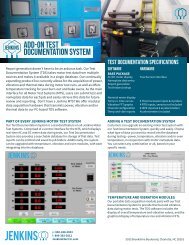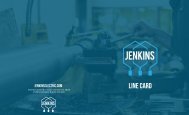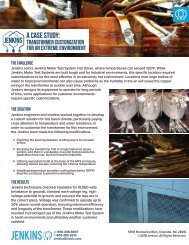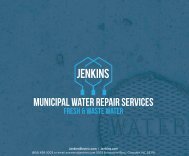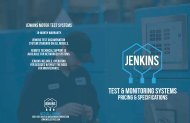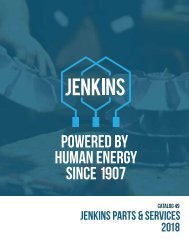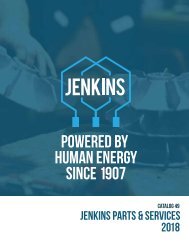Jenkins Options for Generator Rewind Whitepaper
Create successful ePaper yourself
Turn your PDF publications into a flip-book with our unique Google optimized e-Paper software.
I<br />
Introduction<br />
A. Background<br />
Hydro generators operate in a weather controlled situation. By nature, the atmosphere<br />
is damp, and the buildings are cold in the winter. In addition, since river water flow is<br />
not guaranteed, the individual generators run intermittently. They often sit idle <strong>for</strong><br />
weeks or months in a damp atmosphere. Then, the ultimate calamity: the plant floods.<br />
Although a visitor to a hydro station can appreciate the idyllic surroundings, the<br />
generator winding may not be so appreciative. The moisture in the air can creep into the<br />
winding insulation if the surface seal on the insulation has cracked. Water with any<br />
mineral content will provide a conducting path to ground.<br />
Intermittent operation of the generator means the winding temperature rises, and the<br />
conductors expand. Since the stator core iron has a different coefficient of expansion<br />
than the copper conductors, the ground wall insulation is subject to shear <strong>for</strong>ces.<br />
Conversely, when the generator goes off line, the conductors cool and shrink. This<br />
again mechanically stresses the insulation. The field coils do not have the same shear<br />
stress against their core, but turn to turn <strong>for</strong>ces do occur.<br />
[The above comments assume stationary power producing coils in the generator frame<br />
and field coils attached to the rotor with field current supplied through slip rings. [This is<br />
not always the case, as will be illustrated later.]<br />
Surges or lightning strikes are a further source of winding stress. Failure due to a line<br />
surge often occurs in the coils nearest the line connection.<br />
These comments give background <strong>for</strong> visual inspection of a generator with suspected<br />
problems. In every case, fault finding should use most senses.<br />
B. What we are going to talk about<br />
This paper was titled “<strong>Rewind</strong> Decisions”, but we will consider many things involved in a<br />
productive hydro-generating system. Sometimes the generator has known problems<br />
and been left off-line <strong>for</strong> years, waiting <strong>for</strong> a cost driven decision. In other cases, the<br />
generator has been working until an operator has noted a fault and called <strong>for</strong> help. Our<br />
suggested procedure:<br />
1. Review the generator’s history, if available<br />
2. Talk to the operators<br />
5933 Brookshire Blvd. Charlotte, NC 28216 P (800) 438-3003 F (800) 392-2612 <strong>Jenkins</strong>.com


